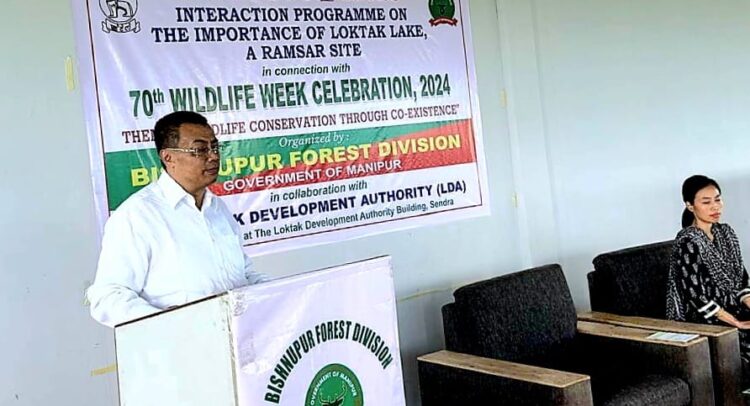Asem Bhakta, Special Correspondent North East
Sendra, Loktak , Manipur : As part of the 70th Wildlife Week celebrations, an insightful interaction programme focusing on ‘The Importance of Loktak Lake, a Ramsar Site’ was organized by the Bishnupur Forest Division in collaboration with the Loktak Development Authority (LDA) at Sendra, Loktak Lake. The event aimed to promote awareness of wildlife conservation and focused on the theme ‘Wildlife Conservation through Co-existence’ and addressed how climate change and human activities are impacting the fragile ecosystems of Loktak Lake and the wildlife it supports.
The programme was graced by the Hon’ble Chairman of LDA, Shri M. Asnikumar Singh, as the Chief Guest, alongside dignitaries including Smt. Waikhom Romabai Devi, MFS, Divisional Forest Officer, Bishnupur Forest Division; Shri Th. Nandagram Singh, EE, LDA; forest officers, staff from the Bishnupur Forest Division, and enthusiastic students from the Loktak area.
Addressing the gathering, Shri Asnikumar underscored the importance of wildlife conservation in India, emphasizing the historical steps the country has taken to protect its natural heritage. He remarked, “Since the enactment of the Indian Forest Act in 1927, followed by the Wildlife Protection Act in 1972 and the establishment of the Indian Board of Wildlife under the chairmanship of the Prime Minister, India has made great strides in wildlife conservation. Under the visionary leadership of Hon’ble Prime Minister Shri Narendra Modi and Union Minister for Environment, Forest and Climate Change, Shri Bhupender Yadav, India is now entering a new phase where conservation efforts are more comprehensive – focused not only on protecting wildlife and their habitats but also on minimizing human footprints while balancing the needs of communities living near these ecosystems.”
He also highlighted the unique ecological value of Manipur’s Loktak Lake and its relationship with the endangered Sangai deer, found only in Keibul Lamjao National Park – the world’s only floating national park. “Loktak Lake is the cradle of Manipuri civilization and supports an exceptional variety of flora and fauna; including a plethora of rare and threatened species. For generations, it has been the lifeline of many local communities. Unfortunately, it faces tremendous biotic pressure. The commissioning of the Ithai Barrage for electricity generation without proper environmental assessment has severely impacted the lake’s ecosystem. There is an urgent need for sustainable development policies to protect this delicate balance,” Shri Asnikumar stressed.
Engaging with the students present, Shri Asnikumar encouraged them to take an active role in environmental conservation. “Students are the future leaders of our nation, and they have a special responsibility in the fight for a more sustainable world”.
He also made a heartfelt appeal to the students present; to act as agents of change in driving the conservation mission of Loktak lake in the years ahead.
“Through education, activism, and community involvement, young people have the power to drive meaningful change and help address environmental challenges head-on,” he said. He also made an appeal to the students to make dedicated efforts towards learning about the plethora of flora and fauna that are found in the Loktak lake and its catchment areas.
The Hon’ble Chairman also elaborated on the efforts of the Manipur state government under the able leadership of Chief Minister Shri N. Biren Singh to elevate Loktak Lake as an iconic wetland globally. “The state government is implementing multiple conservation initiatives for Loktak Lake and its associated wetlands, with a focus on sustainability, preservation of biodiversity, and securing livelihoods for the local communities that depend on the lake for their sustenance,” he noted.
In his concluding remarks, Shri Asnikumar urged students to lead by example through community engagement, sustainable practices, and active participation in policy advocacy to protect the environment for future generations.


